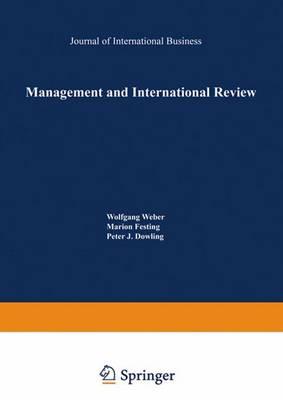Mir Special Issue
1 total work
Wales (UK), Karl-Klaus Pullig, University of Paderborn (Germany), Max RingI- steuer, Catholic University ofEichstatt (Germany), Ewald Scherm, University of Hagen (Germany), Stefan Schmid, Catholic University of Eichstatt (Germany), Karl-Heinz Schmidt, University of Paderborn (Germany), Ursula Schneider, University of Graz (Austria) and Joachim Wolf, University of Hohenheim (Ger- many). For support in the organization of the review process the editors thank Christopher Gramley. The outcome of the review process was that 13 papers were selected for pub- lication in two special isslIes which both address the field of international human resource management. There were many other very well-written and high quality papers but due to space limitations, the editors could not include more contribu- tions. For those interested in the other papers of the IHRM-conference we recom; mend the conference proceedings which are available from the University of Paderborn (E-mail: Testing@notes.uni-paderborn.de).
The selected papers can be related to three broad IHRM-approaches which are described below: * Cross-cultural management approach: early work in this field (especially in Anglo-Saxon cOllntries) emphasized a cross-cultural management approach which examines human behavior within organizations from an international perspective. * Comparative HRM: A second approach developed from the comparative indus- trial relations and HRM literature seeks to describe, compare and analyse HRM systems in various countries. * HRM in mulfinationalJirms: A third approach seeks to focus on aspects ofHRM in multinational firms, especially expatriate management and HR in subsidiaries.
The selected papers can be related to three broad IHRM-approaches which are described below: * Cross-cultural management approach: early work in this field (especially in Anglo-Saxon cOllntries) emphasized a cross-cultural management approach which examines human behavior within organizations from an international perspective. * Comparative HRM: A second approach developed from the comparative indus- trial relations and HRM literature seeks to describe, compare and analyse HRM systems in various countries. * HRM in mulfinationalJirms: A third approach seeks to focus on aspects ofHRM in multinational firms, especially expatriate management and HR in subsidiaries.
